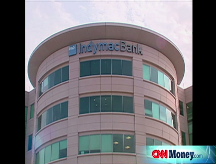How safe is your money, and how to protect it
Yes massive bank failures are rare, but not unheard of. Here's what you need to know to shelter your money if it happens to you.
| MMA | 0.69% |
| $10K MMA | 0.42% |
| 6 month CD | 0.94% |
| 1 yr CD | 1.49% |
| 5 yr CD | 1.93% |
NEW YORK (CNNMoney.com) -- The chances are your bank is not going to shut down overnight.
But if you're at all worried about this in the wake of IndyMac's collapse, there are easy ways to eliminate your exposure today.
"This is the portion of your portfolio that's supposed to help you sleep at night not keep you awake," said Greg McBride, Senior financial analyst at Bankrate.com.
The FDIC, short for the Federal Deposit Insurance Corporation, fully insures individual accounts up to $100,000 per deposit per bank, and $250,000 for most retirement accounts.
The FDIC does not cover money invested in stocks, bonds, mutual funds, life-insurance policies, annuities or municipal securities.
"The bottom line is, if you are putting money into the bank you are purposely settling for a lower return on a no-risk investment," McBride said.
Therefore, "it doesn't make any sense to then expose yourself to the risk of a bank failure."
If your money is is in an account with less than $100,000 at a bank insured by the FDIC, you have nothing to worry about.
If you do have funds that aren't covered by the FDIC, then you have some exposure in the event of a bank failure that can - and should - easily be remedied.
Although about 95% of the $19 billion in deposits at IndyMac were insured, uninsured deposits account for 37% of the $7 trillion on deposit in the U.S. as of March 31, according to LaJuan Williams-Dickerson, a spokeswoman for the FDIC.
To calculate your personal exposure, Williams-Dickerson advises consumers to go to http://www.fdic.gov and click on the Electronic Deposit Insurance Estimator, also known as EDIE.
"Regardless of your bank's health you should look to protect all of your deposits," said McBride. You can do this by moving excess funds to another bank, or by opening separately titled accounts at the same bank.
Spread your funds out by opening accounts with different names, like a joint account with your spouse or named as trusts for your children. But beware: Saving one account under John Doe and another under John J. Doe won't cut it, McBride warned.
Another way to protect your money is to hold accounts under $100,000 at a few separate banks - not just different branches of the same bank.
If you're still worried about whether your money is protected, "talk to the bank about strategies to get additional FDIC insurance," advised James Chessen, chief economist of the American Bankers Association. The bank can help you reorganize your funds to get full coverage.
"It's important to note that bank failures are rare and they are going to be rare in the future," Chessen said. "Ninety-nine percent of the banks out there are well capitalized."
The FDIC disclosed last month that it was closely watching 90 financial institutions on its "problem bank list." While that number is higher than it has been in the last few years, it is still relatively low, Williams-Dickerson said. In fact, there were 2,165 on the list in 1987. The FDIC does not publish the names of the trouble banks for fear of spurring a bank run.
To find out how safe your bank is, you can check out the Safe & Sound rating on Bankrate.com, which provides a sense of the relative financial strength and stability of commercial banks, savings institutions and credit unions.
An earlier version of this story reported that U.S. bank deposits totaled $13.4 trillion. The actual number of total U.S. deposits is $7.0 trillion. ![]()



